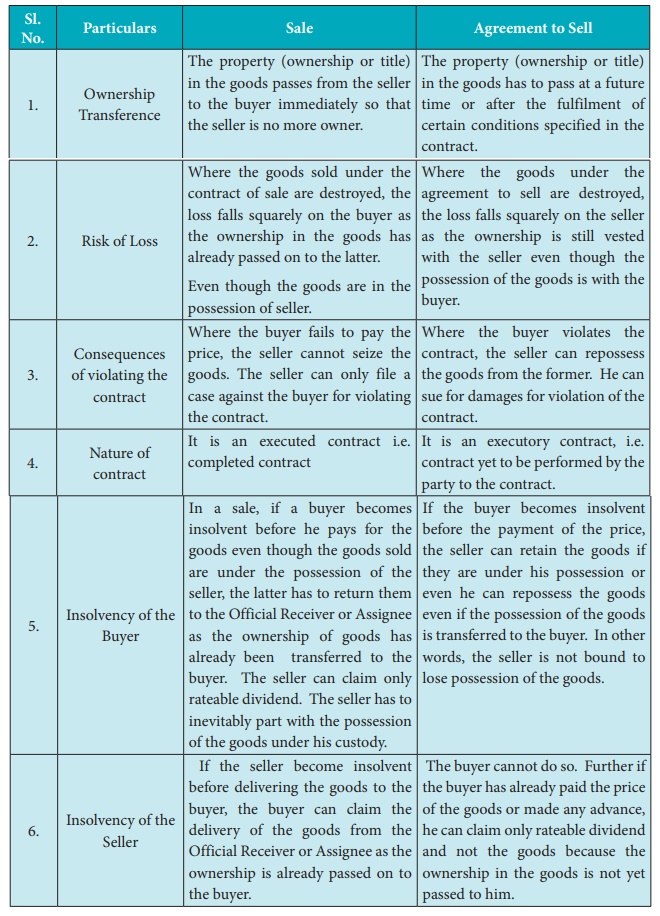The Sale of Goods Act 1930 - Difference between Sale and Agreement to Sell | 12th Commerce : Chapter 21 : The Sale of Goods Act 1930
Chapter: 12th Commerce : Chapter 21 : The Sale of Goods Act 1930
Difference between Sale and Agreement to Sell
Difference between Sale and Agreement to Sell

Sale
1.
Ownership Transference
The property (ownership or title) in the goods
passes from the seller to the buyer immediately so that the seller is no more
owner.
2. Risk
of Loss
Where the goods sold under the contract of sale are
destroyed, the loss falls squarely on the buyer as the ownership in the goods
has already passed on to the latter.
Even though the goods are in the possession of
seller.
3.
Consequences of violating the contract
Where the buyer fails to pay the price, the seller
cannot seize the goods. The seller can only file a case against the buyer for
violating the contract.
4. Nature
of contract
It is an executed contract i.e. completed contract
5.
Insolvency of the Buyer
In a sale, if a buyer becomes insolvent before he
pays for the goods even though the goods sold are under the possession of the
seller, the latter has to return them to the Official Receiver or Assignee as
the ownership of goods has already been transferred to the buyer. The seller
can claim only rateable dividend. The seller has to inevitably part with the
possession of the goods under his custody.
6.
Insolvency of the Seller
If the seller become insolvent before delivering
the goods to the buyer, the buyer can claim the delivery of the goods from the
Official Receiver or Assignee as the ownership is already passed on to the
buyer.
Agreement to Sell
1. Ownership
Transference
The property (ownership or title) in the goods has
to pass at a future time or after the fulfilment of certain conditions
specified in the contract.
2. Risk
of Loss
Where the goods under the agreement to sell are
destroyed, the loss falls squarely on the seller as the ownership is still
vested with the seller even though the possession of the goods is with the
buyer.
3.
Consequences of violating the contract
Where the buyer violates the contract, the seller
can repossess the goods from the former. He can sue for damages for violation
of the contract.
4. Nature
of contract
It is an executory contract, i.e. contract yet to
be performed by the party to the contract.
5.
Insolvency of the Buyer
If the buyer becomes insolvent before the payment of
the price, the seller can retain the goods if they are under his possession or
even he can repossess the goods even if the possession of the goods is
transferred to the buyer. In other words, the seller is not bound to lose
possession of the goods.
6. Insolvency
of the Seller
The buyer cannot do so. Further if the buyer has
already paid the price of the goods or made any advance, he can claim only
rateable dividend and not the goods because the ownership in the goods is not
yet passed to him.
Related Topics